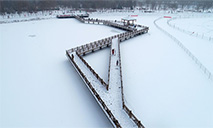Strong vote of confidence given to winter games
Representatives from European destinations say Beijing well equipped to host successful event
Winter sports destinations across Europe have voiced strong confidence in China's ability to ensure the ongoing Winter Olympics are stable and successful, despite challenges posed by the COVID-19 pandemic.
They also firmly believe that the Games must remain free from politics.
Christoph Eisinger, managing director of Ski Amade, a partner of the Thaiwoo Ski Resort in Chongli, Hebei province, which hosts most of the Games skiing events, said, "I am convinced that Beijing will host a perfect Olympics.
"As CEO of one of the biggest European ski areas, I have visited Chinese ski resorts many times. I know how well skiing and all winter sports in China are organized. The transportation system is perfect."
Jakob Falkner, managing director of the Solden ski resort in the Oetztal Alps in the Austrian Tyrol, where the mountain chase sequence for the 2015 James Bond movie Spectre was shot, said, "Beijing has the ability and capability to host the Olympic Games."
Falkner, who three years ago visited Zhangjiakou, where Chongli is located and where the freestyle and Alpine events are being staged, said, "I was very impressed by how fast people worked and how quickly they completed everything."
Reto Gurtner, president of the Laax ski resort in Switzerland, who has formed a strategic partnership with Genting Resort Secret Garden in Chongli, said, "I am convinced China will have the best Olympics we have ever seen, because they have the technology, they have the capacity, and are very fast to learn."
Anna Griesser, chief representative of the Pitztal Glacier and Rifflsee ski resort in Austria, said: "I think Beijing will host a successful and safe Winter Olympics, because it knows the eyes of the world are on the city. The Chinese people also offer perfect hospitality."
Luigi Alvera, vice-mayor of the Italian Alps skiing resort of Cortina, who has been heavily involved in the organization and bidding process for the Milan Cortina Winter Olympics, due to be held in 2026, said, "We are sure Beijing is capable of organizing a successful and safe Olympics in these difficult times of the pandemic.
"Cortina experienced a similar situation with the World Ski Championships in February last year, and yet they were a great success. Sports, and in particular the Olympic Games, are moments of union between people and of creating bonds between nations. A common effort is needed to achieve this."
Barbara Izlakar, a tour guide at the Maribor-Pohorje tourist destination in Slovenia, which boasts the country's largest ski resort, believes Beijing is well capable of hosting the Winter Olympics, partly due to the experience gained in staging the Summer Olympics in 2008.
"Because the city is so big, you have the infrastructure, the accommodations, the transportation and the catering. You can organize everything so that competitors and visitors feel welcome in the city."
At the end of last year, the United States announced a diplomatic boycott of the Winter Olympics in Beijing, deciding not to send officials to the Games. Australia, the United Kingdom and Canada followed suit.
Eisinger said: "Sports and politics should be separated. The focus of the Olympic Games-any sports event-should be on the athletes, the competition and the spectators."
Gurtner said: "I absolutely believe that politics and sports should be completely separated. We should not use sports as a slave of politics."
Karin Seiler, head of the tourism board in Innsbruck, Austria, a city that has twice hosted the Winter Olympics, said: "There is great significance in Beijing hosting the Olympics … What happens there is that people with the same mindset, the same spirit and the same passion come together for sports and for a challenge, and this creates good energy, which then goes out to the whole world."
She said politics has nothing to do with the Games and should be kept separate from them.
Significant boom
China has seen a significant boom in ice and snow sports in recent years, sparked by the Winter Olympics in Beijing.
Despite the pandemic, the number of snow-related sports tourists in the country reached 254 million in the 2020-21 winter season, compared with 170 million five years ago. The number is projected to exceed 300.5 million for the 2021-22 winter season, with snow tourism revenue expected to amount to 323.3 billion yuan ($51.14 billion), according to the China Tourism Academy.
Experts said the Winter Olympics have been key to giving Chinese people a better understanding of winter sports and motivating them to take up such pursuits.
Hermann Winkler, founder of the SnowHowChina consultancy, which helps form winter sports partnerships between China and Alpine destinations, said, "The Winter Olympics is the biggest marketing campaign for winter sports China has ever seen, and the Games will mark a milestone for winter sports development in the nation and will continue growing from this solid base."
Winkler said he is confident that Beijing 2022 will not be the "beginning of the end", but the "end of the beginning" for winter sports in China.
Ahead of the Games, SnowHowChina published a report titled All Eyes on Beijing Winter Games-22 Projections. The report suggested that China is highly likely to be a leading sports nation globally and will probably become the top skiing nation, at least in terms of the number of participants, despite the uncertain situation caused by the pandemic and also the pressure of the Olympics.
In 2019, a total of 770 ski resorts were operating in China, one-third of which had opened in the past five years, according to the 2020 China Ski Industry White Paper. Experts believe the government can capitalize on the Olympics momentum and further popularize winter sports nationwide.
Laurent Vanat, author of the annual International Report on Snow and Mountain Tourism, who is based in Switzerland, said: "China will soon have nearly 1,000 ski areas, which is the highest number of any country in the world, so this is a good starting point. There are also skiing facilities throughout the country, even in places where there is no natural snow-so this is another asset."
Vanat said skiing has been promoted as a healthy sport, not just a trendy leisure pursuit. "Fashion changes, but much less, dedication to healthy sports," he added. "However, learning to ski must be fun and pleasant for beginners, so that they come back."
He said that stars such as 18-year-old freestyle skier Gu Ailing can help popularize skiing among young Chinese and ultimately attract more people to ice and snow sports.
"It may not be scientifically proven, but it has been noticed in other countries that there is a connection between the performance of national champions and young people's interest in skiing," Vanat said.
"For instance, in my country, Switzerland, we had well-known champions in the 1970s, when skiing became extremely popular."
In its bid for the 2022 Winter Olympics, the Chinese government pledged in 2015 to raise the number of winter sports participants in the country to 300 million by this year. Latest figures from the National Bureau of Statistics show that more than 346 million Chinese have taken up winter sports.
Mark Thomas, managing director of S2M Consulting, a China-focused sports event company, said: "There is a strong argument to suggest China would have become the world's largest winter sports market, with or without the Winter Olympics. However, the Games have massively accelerated this process, driven by government policy and investment."
While there is still much work to be done regarding the legacy of the Games, including continued investment and education, Thomas said, "Given the sheer scale of China in terms of population, natural resources and an increasing middle class focused on health, fitness and leisure, it is only a matter of when, not if."
He said ice and snow sports will continue to grow in China, but in the meantime, it is also important that the government preserves the Olympic legacy.
"Facilities will have to be adapted for public use, and long-term policies need to be instigated to stimulate public and private sector investment not only in these facilities, but most important, in education and grassroots development to stimulate mass participation," he added.
Destinations encouraged
Experts are confident that the increased Chinese interest in and demand for ice and snow sports, sparked by Beijing 2022, will also benefit international destinations, including those in Europe, and provide a good opportunity for traditional skiing regions.
Winkler, from SnowHowChina, said the 2022 Winter Olympics are highly likely to result in rising numbers of Chinese tourists visiting international ski resorts.
He said that on the one hand, Alpine countries are facing challenges in encouraging visitors, especially younger target groups. But on the other hand, "there is China, the world's most populous nation, and soon-to-be the biggest sports market with millions of consumers eager for experience. This represents a one-time opportunity to use more than 100 years of winter sports know-how and competence."
Emanuel Lehner-Telic, Asia regional manager at the Austrian National Tourist Office in Beijing, said, "Once traveling from and to China becomes easier again, European skiing destinations, including those in Austria, will certainly benefit from the increased Chinese demand.
"Before the pandemic, we saw a significant rise in the number of Chinese winter tourists to Austria. Our Chinese guests were interested in all winter-related pursuits-visiting romantic villages, strolling through markets, walking in a winter wonderland and, of course, skiing," he said. "Beijing 2022 is certainly a milestone in the world winter sports industry and its related fields."
Markus Berger, spokesman for Switzerland Tourism, said the 2022 Winter Olympics and the Chinese government's initiatives to promote winter sports "will have a positive impact on our efforts and will help increase the desire to visit Switzerland as a winter destination."
Photos
Related Stories
- Women snowboarders raise China's medal tally hopes
- German skier Geiger wins first Nordic combined gold at Beijing 2022
- Awarding ceremony of men's freeski big air at Beijing 2022
- Profile: Mexico's first Olympic figure skater in 30 years sees dream come true in Beijing
- Athletes praise organization of Beijing Winter Olympics: IOC official
Copyright © 2022 People's Daily Online. All Rights Reserved.










